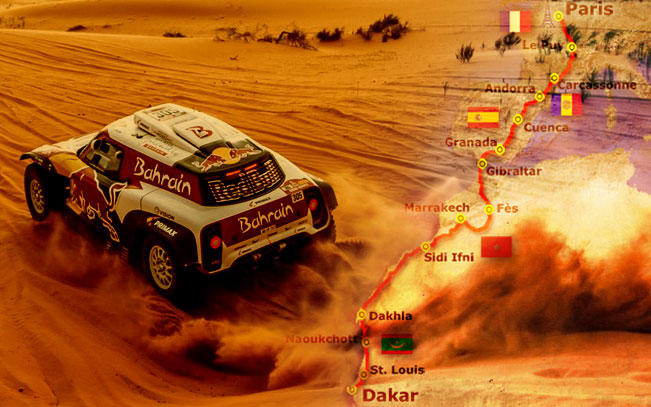You may have heard of the Dakar Rally. This is an off-road, and often insanely dangerous race. Drivers must traverse sand dunes, mud, grass and rocks. Started in 1977, the 10,000 km race ran from Paris to Dakar. It’s previous name was in fact, the Paris-Dakar Rally. Hundreds of drivers take part in the event, though the route has since been moved to different countries due to security concerns. In 2009 the event was held in South America, but it is best known and named for its original route.
There are 5 main classes of vehicle in the race; motorbike, quads, cars, trucks and UTVs.
A dangerous race
People have died, either innocent bystanders or race participants. People have also gone missing off track for days at a time. In 1982, Mark Thatcher, son of British Prime Minister Margaret Thatcher went missing for 6 days. He and his team were eventually spotted by a search plane 50km off course but unhurt.
In 1986, race organizer Thierry Sabine was killed in a helicopter crash caused by a sandstorm.
In 1988 6 people died due to the race; 3 race participants and more tragically 3 local residents, including a mother and child killed by a film crew. A 10 year old girl called Baye Sibi was crossing the road when she was hit by an oncoming racer. An awful tragedy just for the sake of a wealthy person’s sport.
These were not the only deaths directly resulting from the race. A total of 50 people have been killed by Dakar Rally, and yet it continues to draw competitors and spectators every year.
Criticism of Dakar Rally
The race has been heavily criticized for not bringing additional prosperity or opportunity for those living along the route. Local people were actually more likely to suffer the negative consequences of dust disruption on their livestock and agriculture.
More tragic outcomes involved accidental injury or death of local inhabitants hit by competitors. It has been seen by some as a vulgar display of power and wealth. This seems particularly poignant as it tracks through places of less economic prosperity. The race has also been heavily criticized for its environmental impact. It has caused substantial damage along its route to historical and geological features.
The Dakar Rally is to be held in 2021 in Saudi Arabia. Again, drawing heavy criticism due to the country’s human rights record particularly when it comes to women. The Saudi government has sought to make examples of women’s rights activists by placing several in jail. These activists are simply advocating women’s right to drive. Loujain al-Hathloul was sentenced to nearly 6 years in prison. She was arrested shortly before the decades long ban on women driving was lifted in 2018. Critics claim for a sporting organizer to sync up with Saudi establishment means that they should also be pursuing to improve human rights policies in the area.
The race will start and finish in Jeddah. Around 330 vehicles have already been confirmed as entrants to the 2021 race.

